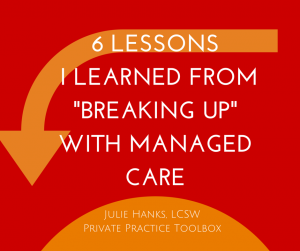 One of the wonderful challenges that comes from having an abundance of business is the need to add new additional clinicians to your practice. But how exactly do you know who will be a good fit? How can you be sure to make the best choice that will benefit both the clients and your practice?
Not too long after opening Wasatch Family Therapy, I had created relationships in my community and built my online presence to the point that the demand for my services exceeded the supply I could provide. In other words, I needed to hire new therapists! Since I do not have a background in business, the process was entirely new to me, but thankfully I found that it happened quite naturally. I identified a few key criteria (beyond simply having required credentials and experience) that a candidate must possess in order for me to feel like he/she was a good enough match to hire. Here are 4 questions to ask yourself when meeting with an applicant who you may potentially bring in to your practice:
One of the wonderful challenges that comes from having an abundance of business is the need to add new additional clinicians to your practice. But how exactly do you know who will be a good fit? How can you be sure to make the best choice that will benefit both the clients and your practice?
Not too long after opening Wasatch Family Therapy, I had created relationships in my community and built my online presence to the point that the demand for my services exceeded the supply I could provide. In other words, I needed to hire new therapists! Since I do not have a background in business, the process was entirely new to me, but thankfully I found that it happened quite naturally. I identified a few key criteria (beyond simply having required credentials and experience) that a candidate must possess in order for me to feel like he/she was a good enough match to hire. Here are 4 questions to ask yourself when meeting with an applicant who you may potentially bring in to your practice:
-
Do I like him/her?
It may seem obvious, but it's critical that you feel comfortable with an individual who may be working for you. If you do not like to be in his/her presence, why would a client? It goes without saying that people skills are invaluable in this profession; it's what we do! Look for someone who puts you at ease, is warm and inviting, and who you find yourself attaching with. Be mindful of the emotional climate of your practice; you want to bring someone in who will work well with others, avoid drama, and of course help clients through their emotional struggles. Whether or not I genuinely like someone is the most important factor determining if I hire him/her (interestingly, this same criteria is also usually first on the list of what a client looks for in a therapist).
-
Were they born to be a therapist?
When looking to add to my practice, I look for individuals who I can sense were born to do therapy. It's common for practitioners to work with a lot of graduate level interns, and there are a select few who truly stand out; people who are naturally thoughtful, reflective, and sensitive to others' needs and feelings. I want someone who's always had the intuition and instinct of a therapist who just had to go through the official training to actually become one.
-
Are they emotionally stable?
This question is admittedly a bit delicate. While no one has it all together all the time, it naturally follows that someone who has a handle on his/her emotional issues can better assist clients in managing their own. Good therapists often use difficult past life experiences to relate to and help clients, so being "emotionally stable" doesn't necessarily mean you've never struggled mental health or relationship problems; quite the opposite can be true! To use an analogy, you cannot be a tour guide for other people to places you've never traveled. Still, I need my therapists to be healthy in order to best serve our clients.
-
Do they reflect the values of my practice?
As the owner of my practice, I need therapists who work for me to be similar to me in many ways. This is not to say, of course, that I am wanting someone with the exact personality, training, and expertise that I have. Still, there needs to be a continuity of approach and therapy style common to our clinicians. Throughout the years, we've had inquiring individuals wanting to see me specifically after hearing me speak or learning about me through social media. When I don't have an available opening to see someone new, I like to be able to state my confidence in another therapist and tell the prospective client that I've hand-selected a particular counselor that I wholeheartedly trust to do good work. I suggest that practitioners looking to hire new therapists identify a few specific values that are key to the philosophy and setting of their private practice to look for in applicants.
What do YOU look for when hiring new clinicians?
Let me know!
This post was adapted from an interview I did with Joe Sanok, LPC on" Practice of the Practice." Click here for access to the full podcast.
Join my Private Practice Toolbox Facebook group and connect with over 3100 therapists around the globe in 2 simple steps: 1) Click request to join the group and 2) Fill out this brief questionnaire before you’ll be added to the group.Get practice tips and blog updates in your inbox.
Get 52 FREE Blog Topics and prompts when you sign up for the PPT Newsletter (that’s a year's worth of weekly blog posts!)
 Want to grow your practice and make a difference beyond the therapy office? Check out my NEW Rock The Media School for Therapists - a 6-week online media + social media training designed for health and mental health practitioners. Learn how to build your media and your online presence so you can share your passion and practice with thousands of people! I hope you'll join me. Fall cohort begins Sept. 7, 2015.
Want to grow your practice and make a difference beyond the therapy office? Check out my NEW Rock The Media School for Therapists - a 6-week online media + social media training designed for health and mental health practitioners. Learn how to build your media and your online presence so you can share your passion and practice with thousands of people! I hope you'll join me. Fall cohort begins Sept. 7, 2015.






As healers, we genuinely like to do our work. Guiding clients through the therapy process and seeing them make progress is why we do what we do. But if you're in private practice, you know there's a lot going on in the back end and that it's crucial to run an efficient and organized business.